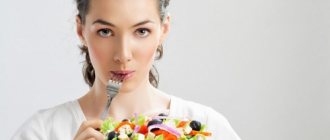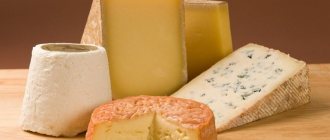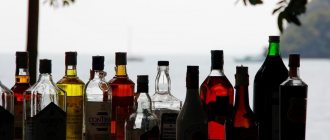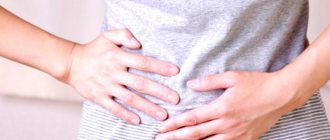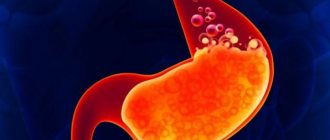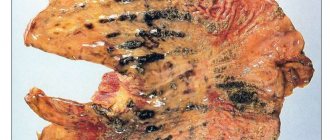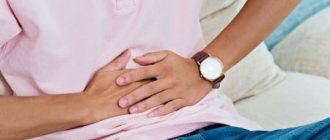- September 10, 2018
- Gastroenterology
- Nadezhda Devlyashova
Often, diseases of the gastrointestinal tract are formed through the fault of the person himself; the cause is often food addictions that do not meet the rules of a healthy diet. A diet for reflux gastritis can help you get rid of the disease, in most cases forever. Doctors have long confirmed the fact that diets make it possible to cope with many diseases. By following simple rules, the patient can independently improve his health, forget about illnesses, or at least achieve stable remission.
Reflux esophagitis, reflux gastritis
Irregular eating behavior is characterized by irregular eating, overeating, large amounts of food before bed, excessive amounts of carbonated drinks, coffee, tea, alcohol, and fast food. This leads to problems with the gastrointestinal tract, gastritis and reflux. Diet in such cases can correct the situation.
Smoking and the Helicobacter bacteria have a detrimental effect on the gastric mucosa.
If the functions of the sphincter are impaired, it ceases to provide protection, the barrier to acid does not work and it is thrown into the esophagus. The mucous membranes become irritated, acid aggression contributes to the development of chronic inflammation (reflux esophagitis). Symptoms of the disease are heartburn, belching of food or air, a feeling of heaviness.
With reflux gastritis, disturbances are observed in the work of the pylorus. In this case, reflux occurs from the duodenum into the stomach. The food thrown back contains admixtures of aggressive acid and bile. The stomach cannot cope with such an environment, and its walls become inflamed. In addition to drug treatment, it is necessary to follow a diet for reflux gastritis. Only an integrated approach can stop the development of inflammation.
What is a treatment table for reflux esophagitis?
The principle of nutrition for reflux esophagitis is a mechanically and chemically gentle diet.
For this disease, the patient is assigned to treatment table No. 1 according to Pevzner. You have to constantly follow or adhere to this table in case of chronic form of reflux esophagitis. In case of acute course or exacerbation of the disease, the doctor prescribes table No. 1 b.
Table No. 1 is prescribed to patients with diseases of the digestive system
Amount of nutrients per day:
- fats 100 g;
- proteins 90–100 g;
- carbohydrates up to 400 g;
- sodium chloride 10–12 g.
Food should not irritate the mucous membranes of the stomach and esophagus or stimulate the production of hydrochloric acid, or cause bloating. The energy value per day is 2500–2800 kcal. Free fluid per day – 1.5 liters.
Danger of Reflux
If the patient does not want to change his lifestyle, does not give up bad habits, and continues to eat improperly, with reflux esophagitis, acid will constantly be thrown into the esophagus and injure the mucous membrane. This leads to the formation of erosions and ulcers on the walls. Next, connective tissue scars begin to form in these places, and they, in turn, lead to stenosis of the esophagus, when its lumen narrows. The most serious complication is the transformation (degeneration) of epithelial tissues into cancer cells.
With superficial reflux gastritis, new cells also form in the stomach in place of the affected cells. The digestion process is disrupted and there is a risk of cancer. The erosive type threatens to develop into an ulcer. Atrophic reflux gastritis is the most dangerous and is a precancerous condition.
Basic nutrition rules
Treatment of the disease consists of following a diet, giving up prohibited foods, cigarettes and alcohol. You should always follow the general rules of nutrition for reflux:
- Diet. Dietary fractional meals 5-6 times a day in small portions prevent the production of excess acid and food from entering the esophagus. Dinner should be 2 hours before bedtime. The horizontal position immediately after eating facilitates the easy movement of gastric contents into the esophagus. After eating, you should also not bend over.
- Rules for eating food. You need to eat food slowly and chew it thoroughly, thereby facilitating digestion in the stomach. Large pieces remain in the stomach for a long time, provoking the production of acid. When you eat quickly, air enters the stomach, creating increased pressure and making it easier for it to enter the esophagus. Before eating, chew 2-3 slices of raw potatoes. They will reduce the acidity of gastric juice.
Potato juice
- Food temperature. With esophageal esophagitis, food should be taken warm, not cold or hot. The optimal food temperature is from 15 to 60 °C. Hot and cold foods stimulate the secretion of acid by the glands of the stomach.
- Liquid and salt. The diet for gastritis and esophagitis limits fluid intake to 1.5 liters per day. In addition, you should not drink liquid immediately after eating, so as not to cause an increase in pressure in the stomach and the release of food into the esophagus. Salt is limited to 10 grams. Excessive salt intake irritates the gastrointestinal mucosa.
- Culinary processing. Dietary dishes should be boiled, steamed, stewed or baked. The food is boiled, finely chopped or put through a blender. Fried foods are excluded because the crust irritates the mucous membrane. In addition, fried food, remaining longer in the stomach, provokes the release of acid from its glands.
- Alcohol ban. During treatment, alcohol intake is excluded because it irritates the wall of the esophagus and stimulates the production of acid in the stomach. Moreover, you should not drink alcohol on an empty stomach.
In addition to following these rules, you should not take antacids (neutralizing acidity) and prokinetics (acting on the motor activity of the esophagus and stomach) on your own. To reduce the acidity of gastric juice, hydrogen pump blockers (Pantoprazole, Omeprazole) are prescribed.
The diet for reflux esophagitis is followed constantly. Otherwise, a relapse is possible.
Reflux gastritis: treatment, diet
Complications of the disease pose a great danger to life, so you should not neglect the symptoms; you must immediately seek medical help. After conducting a diagnostic examination and establishing a diagnosis, the doctor will prescribe treatment. Modern methods will allow you to get rid of symptoms, stop exacerbation and even completely recover from the disease. Treatment of reflux gastritis is always carried out comprehensively, including:
- proper nutrition;
- good vacation;
- healthy sleep;
- drug therapy.
Even the most modern medications that cope with erosions and get rid of reflux will be meaningless if you do not adhere to proper nutrition. Therefore, a diet for reflux gastritis with high acidity is a prerequisite in the fight against the disease.
There are cases when, when treating the initial stages of a disease, a properly selected diet and compliance with nutritional requirements over a long period of time make it possible to cope with the disease without any medications.
Herbal decoction
Traditional medicine offers many recipes for herbal decoctions that help alleviate the human condition and improve the digestion process.
Medicinal decoctions:
- chamomile relieves inflammation and soothes;
- Rose hips are rich in vitamin C and have a beneficial effect on the stomach;
- calendula relieves discomfort and inflammation in the stomach;
- plantain has healing abilities.
All decoctions can be drunk throughout the day in between meals. Taking decoctions before bed is most effective.
Treatment of gastritis reflux consists of adjusting nutrition and following a certain diet. Specially selected ingredients improve digestion, reduce stress on the stomach and eliminate the unpleasant symptoms of gastritis.
Basic lifestyle recommendations for gerb
A detailed list of prohibited and permitted foods allows you to follow the instructions exactly and easily create a varied daily diet and menu for the week. Additional intake of medicinal herbal decoctions will help you quickly cope with the discomfort of gastritis and improve your well-being.
We recommend: Causes and treatment of gastritis with high acidity
Diet principles
A diet for reflux gastritis involves frequent meals, but in small quantities, that is, there should not be a feeling of overeating, but it is not recommended to experience hunger. Use small plates, they will help dose out food and get rid of excess food. You need to eat slowly, without distraction, chewing your food thoroughly. Food should not be too cold or hot. Products can be boiled, steamed or stewed.
After eating, you should not burden yourself with physical labor or, conversely, lie down. Slow walking is recommended. Before going to bed, the last meal should take place no later than two hours, so the food can be processed.
If you smoke, you need to get rid of this bad habit during treatment, or even better - forever. Forget about alcohol and carbonated drinks.
You will have to exclude everything spicy, salty, smoked, fried, and fatty from the menu. These products lead to irritation of the gastric mucosa, causing heartburn and reflux.
Approximate daily dietary intake
You can think over a menu for every day up to a week. Believe me, even with such a limited diet, you can eat varied. The main thing is to listen to your body and the doctor’s advice.
Option #1
- Breakfast: prepare buckwheat porridge with milk. To enhance the taste, you can add a small piece of butter.
- Lunch: You can have a snack before lunch, for example, toasted bread and unleavened cottage cheese.
- Lunch : boil vegetables: potatoes, carrots with a lean piece of meat and prepare puree soup.
- Afternoon snack : treat yourself to dry cookies, baked apple and dried fruit compote.
- Dinner : cook lean fish and mashed potatoes, as well as herbal tea in a double boiler or on the stove.
Option No. 2
- Breakfast: separate the white from the yolk and prepare a steamed protein omelette,
- Lunch: you can make a casserole from unleavened cottage cheese, but without a fried crust, and weak tea with milk.
- Lunch : make a light soup with potatoes and carrots, but without frying, prepare meatballs from lean animal meat and add them to the soup.
- Afternoon snack : fruit or milk jelly with cookies will help cope with the feeling of hunger and reduce inflammation.
- Dinner : boil pumpkin pieces and puree them using a blender; make steamed chicken cutlets. Instead of pumpkin, you can use any permitted vegetables: potatoes, carrots, cauliflower and others.
Prohibited for use
When treating gastritis, special attention should be paid to diet. Products should help normalize the functioning of the entire gastrointestinal tract, restore intestinal motility, reduce acidity and normalize microflora. A diet for erosive reflux gastritis helps achieve stable remission and relieves many painful symptoms.
For any form of gastritis, you must exclude from your diet:
- Semi-finished products.
- Fatty, hot, salty, spicy, fried, canned foods.
- Sweet carbonated water, alcoholic drinks.
- Sweets, flour confectionery products.
- Products containing harmful food additives and dyes.
- Mushroom and fatty meat broths.
- Mayonnaise, ketchup, sauces.
- Strong coffee, black tea.
- Marinated dishes.
- Hard-boiled eggs.
- Dairy products.
- Flatulence-causing foods (fresh cabbage, black bread, legumes).
- Vegetables, fruits, fresh greens in raw form. They must undergo heat treatment before use.
General rules
Esophagitis is inflammation of the mucous membrane of the esophagus. Chronic diseases of the esophagus are most often associated with the reflux of gastric and duodenal contents into the esophagus (esophageal reflux). Hydrochloric acid , pepsin , and bile acids are considered factors of aggression that have a damaging effect. At the same time, bile acids can also cause malignancy (malignancy). The appearance of reflux is influenced by many factors: impaired gastric motility, short esophagus, decreased tone of the esophageal sphincters, diaphragmatic hernia or increased intra-abdominal pressure.
Thus, esophagitis is the most common complication of gastroesophageal disease and occurs in a third of patients suffering from this disease. There are catarrhal (non-erosive) and erosive forms of the disease. For a long time it was believed that these were successive stages of development, but the results of observations suggest that these forms do not tend to transform into one another and exist independently. It has also been found that esophagitis is not caused by direct mucosal acid damage, but by complex cytokine-induced mechanisms .
Separately, it is worth highlighting esophagitis caused by taking medications (these include non-steroidal anti-inflammatory drugs and biosphosphonates), radiation therapy and Candida fungi.
The bacterium Pyloric Helicobacter plays a major role in the development of gastritis (meaning the chronic form). Therefore, all patients with chronic gastritis are advised not only to undergo endoscopy, but also to diagnose H. Pylori infection.
With gastritis and esophagitis, the patient is bothered by epigastric pain, heartburn , sour belching and chest discomfort (feeling of a lump). Heartburn may worsen when lying down, after eating and eating foods that weaken the tone of the esophageal sphincter (alcohol, coffee, animal fats, chocolate, citrus fruits).
“Small” organic signs of gastrointestinal damage (gastritis and catarrhal esophagitis) are easier to treat than “large” (ulcerative esophagitis) and functional disorders.
The nutrition of patients is certainly of great importance. Eating spicy foods, hot and rough foods has an irritating effect and aggravates the course of gastritis and esophagitis. And fatty and fried foods, smoked foods, and alcohol cause increased reflux, which maintains inflammation of the esophagus. Eating a lot of food at night causes increased production of hydrochloric acid and contributes to its reflux into the esophagus at night.
The diet for gastritis and esophagitis is aimed at sparing the mucous membrane of the stomach and esophagus, and involves reducing the frequency of reflux. In this regard, it is recommended:
- split meals and moderate meals in the evening;
- consumption of products with an alkaline reaction (sour cream, cottage cheese, boiled meat, milk, steamed omelettes);
- limit the consumption of foods that have an irritating effect (hot, spicy, alcohol, coffee, onions, garlic, citrus fruits, sour foods);
- exclusion of foods that reduce the tone of the esophageal sphincter (animal fats, carbonated drinks, chocolate, strong coffee, rye bread).
For reflux and heartburn symptoms:
- quitting smoking, since nicotine weakens the tone of the esophageal sphincter;
- avoid bending over and performing exercises that involve abdominal tension;
- avoid constipation, as straining increases intra-abdominal pressure;
- exclusion of foods that cause flatulence (legumes, grapes, carbonated drinks, kvass, yeast baked goods, bread, raisins);
- Avoid taking medications that can cause reflux (beta blockers, tranquilizers, sedatives, theophylline , nitrates, prostaglandins, calcium channel inhibitors).
For these diseases, food should be boiled or steamed. The degree of sparing (meaning rubbing of food) depends on changes in the mucous membrane and the severity of symptoms. In case of erosive lesions of the mucous membrane of the stomach and esophagus, as well as severe pain symptoms, the most gentle diet is recommended, corresponding to dietary Table No. 1A :
- Meat/poultry/fish dishes prepared in the form of puree or soufflé (the meat is scrolled several times or beaten in a blender).
- Decoctions of cereals, pureed soups, puree soups with the addition of raw beaten eggs or cream.
- Milk, cream, thoroughly pureed cottage cheese or cottage cheese soufflé.
- Steamed omelettes or soft-boiled eggs.
- Buckwheat or oatmeal porridge, boiled in water and, if desired, milk. You can prepare pureed semi-liquid porridge with butter.
- Jelly made from berries and fruits, fruit jellies with sugar and honey.
- Tea with milk, rosehip infusion, diluted juices.
With catarrhal esophagitis and gastritis, there is no need for maximum sparing of the mucous membrane and patients are recommended to eat Tables No. 1B or No. 1 , in which wiping of food is not provided. Table No. 1 is suitable for long-term or constant nutrition , since its composition is complete and at the same time gentle on the stomach. No. 1 is recommended during the period of recovery and consolidation of treatment results. It is fashionable to use this therapeutic food during periods of mild exacerbation or in the autumn-spring period, when the patient is taking anti-relapse treatment.
All irritating foods are excluded - broths, citrus fruits, rye bread, chocolate, tomatoes, dairy products, ketchup, turnips, radishes, sour drinks, citrus juices, onions, garlic, coarse cereals, tomato paste, cranberries, peppers, spices, mint, meat with tendons, ginger, alcohol, coffee, strong tea.
The amount of protein in the diet increases to 100 g per day, especially in the presence of erosions and esophageal reflux. This is explained by the fact that protein is necessary for reparative processes, and it increases the tone of the esophageal sphincters. At the same time, it is recommended to reduce animal fats in the diet - you should not eat cream, fatty pork, butter in large quantities, fatty goose and duck meat, or products with butter cream. This is due to the fact that fatty and fried foods reduce the tone of the sphincter, and this leads to the reflux of gastric contents into the esophagus and maintains constant irritation and inflammation of its mucosa.
What foods can you eat?
A diet for reflux gastritis and reflux esophagitis allows you to include the following products in your meals:
- Meat – rabbit, poultry, lean pork; Fat and skin must be removed before cooking.
- Seafood and lean fish.
- Cereals – buckwheat, oatmeal, millet.
- Bread - whole grain yesterday's baked goods, bran, crispbread, savory crackers.
- Pasta made from durum wheat.
- Vegetables - eggplant, carrots, zucchini, beets, celery, pumpkin, bell peppers, cabbage (all stewed).
- Fruits - sour apples, melon, watermelon, pears, berries, all in small quantities.
- Milk - low-fat fermented milk, cottage cheese.
- Drinks – drinking water, still mineral water, weak tea, herbal decoctions, jelly, non-concentrated compote.
What foods and dishes are not recommended for reflux gastritis?
To reduce the aggressive effects of acids on the gastric mucosa, the doctor recommends that the patient adhere to a certain diet that excludes the following types of dishes :
- fried;
- spicy;
- canned;
- spicy;
- fat;
- salty;
- pickled.
We recommend: Diet for gastritis in the acute stage: healthy, meaningful and tasty!
These dishes should be excluded from the patient’s diet even if he feels well. They are extremely dangerous for biliary reflux, when the functioning of the human biliary system is disrupted.
To prevent gastritis from developing further, experts recommend reviewing your diet and excluding the following foods from it :
- rich fish and meat broths;
- honey, jam, sugar;
- liquid milk porridges;
- fresh and rich pastries, shortbread cookies;
- sour, unripe fruits and berries;
- vegetables that contribute to gas formation and bloating, for example, peas, cabbage, onions;
- dairy products;
- coffee, carbonated and alcoholic drinks, kvass;
- sunflower seeds;
- citrus fruit;
- tomato;
- mint and products containing it;
- confectionery;
- nuts.
In any case, consultation with a specialist is necessary. Having studied the patient’s condition, the doctor will give certain recommendations on dietary nutrition and the consumption of certain foods, and will help create an approximate menu for reflux gastritis.
Allowed dishes from the menu
The diet for reflux esophagitis and gastritis allows the following first courses on the menu:
- Chicken or milk soup with the addition of durum wheat vermicelli.
- Vegetable puree soup.
- Vegetarian soups with a vegetable base.
- Fruit puree soups.
The diet must contain all the necessary substances, minerals, and vitamins. Where do you get the main micronutrient protein? From the following products:
- Boiled meatballs or steamed cutlets from lean meats.
- "Doctor's" is a real sausage.
- Kefir, cottage cheese, sour cream, milk - low-fat.
- Stewed or boiled lean fish.
- Steamed egg omelet (no more than twice a week).
The diet includes the following types of side dishes that can be served with cutlets or lean boiled meat:
- Mashed potatoes with water or milk without adding eggs or butter.
- Jacket potatoes.
- Porridges: rolled oatmeal, buckwheat, rice, semolina - all with water.
- Twice a week porridge with milk.
- Vermicelli, pasta with a drop of vegetable oil.
"Safe" recipes
For patients with biliary reflux, it is quite possible to prepare your favorite dishes by replacing some ingredients with dietary ones. We advise you to try several original dishes that will only benefit your inflamed stomach.
Bubert
This is a traditional Baltic dish similar to porridge. The main difference from porridge is the method of preparation: bubert is not boiled, but brewed.
Ingredients:
- 1 glass of low-fat milk;
- 2 eggs;
- 2 tbsp. l. semolina;
- 1 tbsp. l. Sahara;
- salt to taste.
Preparation:
- Break the eggs and separate the whites and yolks.
- Beat the yolks with sugar until a whitish mass is obtained.
- Beat the egg whites separately until stiff peaks form.
- Let the milk boil.
- After it boils, slowly add semolina and cook for 3 minutes.
- Remove from heat, add the yolks, then the protein mixture, stirring the mixture thoroughly each time.
- Cover with a lid and let sit for 10 minutes.
Potato gratin with lean minced meat
Gratin is a French potato pie. The original recipe includes hot spices and mayonnaise. We suggest preparing gratin in a dietary version.
You will need:
- 500 g potatoes;
- 300 g minced beef;
- 50 g soft cheese;
- 150 ml milk;
- 70 g onions;
- 1 egg;
- 100 g low-fat sour cream;
- 15 ml olive oil;
- salt to taste.
Action plan:
- Finely chop the onion and mix with the minced meat.
- Place the minced meat in a frying pan, cover with a lid and simmer for 3-4 minutes.
- Three cheeses on a fine grater.
- Peel the potatoes, cut them into very thin circles, and dry them with a towel.
- Grease a baking dish with olive oil.
- We lay out a third of the potato circles along the bottom, distribute half of the minced meat over them, add salt, cover with a thin layer of sour cream and grated cheese, again lay out the potatoes, minced meat, sour cream, cheese in layers and the remaining potatoes on the top layer.
- Cover the pan with foil and place in an oven preheated to 180 degrees for 20 minutes.
- Whisk the milk with the egg and pour the gratin mixture over it.
- Cook for another quarter of an hour without foil.
carrot cookies
Compound:
- 350 g flour;
- 250 g carrots;
- 60 g granulated sugar;
- 70 ml olive oil;
- 1 tsp. baking powder;
- ¼ tsp. salt.
How to cook:
- Grate the carrots on a fine grater, add sugar to it, and let it brew for 10 minutes.
- Mix flour, baking powder, salt, add butter and carrots with sugar.
- Mix everything thoroughly and form cookies.
- Place them on a parchment-lined baking sheet.
- Cook in the oven at 180 degrees for about half an hour.
Recipes
A diet for reflux gastritis for every day may seem difficult to follow only at first glance. A nutritionist will help you create a menu for the week, describe the correct combination and quantity of foods, and their calorie content. Next, you will just need to experiment, alternate these dishes and change places every day of the week.
The recipes below will help you diversify your diet and treat yourself to healthy, delicious dishes.
So, the recommended breakfast includes delicious semolina-oatmeal porridge with dried fruits. To prepare it, you will need: half a glass of semolina, half a glass of oatmeal, low-fat milk - half a liter, chopped dried apricots and prunes - two tablespoons.
Preparation: bring the milk to a boil, mix the cereals together and gradually pour them into the heated milk, add dried fruits. Cook for five minutes. Close the lid and let the porridge sit for ten minutes. Breakfast is ready.
A diet for exacerbation of reflux gastritis allows you to include a delicious dish on the menu that is suitable for both lunch and dinner.
Products: permitted boiled vegetables (any); boiled chicken fillet, herbs, salt, low-fat sour cream.
Boil vegetables that are acceptable on the diet. Separately cook the chicken fillet. Place everything in a blender glass and pour in some vegetable broth. Turn the whole mass into puree soup. This hearty and nutritious dish is suitable for both lunch and dinner.
Seven-day menu
Day 1
Breakfast: oatmeal with strawberry jam; weak green tea.
Lunch: banana-cheese casserole, apple juice.
Lunch: chicken noodle soup, river trout baked with vegetables, dried fruit compote (without berries).
Afternoon snack: biscuits with soft cheese, fruit and berry jelly.
Dinner: potato casserole with minced beef, cherry pudding, tea with milk.
Before bed: natural low-fat yogurt.
Day 2
Breakfast: buckwheat porridge with pumpkin and carrots, apple smoothie.
Lunch: manna, weak green tea.
Lunch: diet cream cheese soup, chicken pieces with pumpkin puree, milk jelly.
Afternoon snack: vanilla cookies made from soft dough, chamomile infusion.
Dinner: fish pie with hake made from soft pastry, vanilla soufflé, still mineral water.
Before bed: banana milkshake.
Day 3
Breakfast: semolina porridge with a decoction of dried fruits (without berries), chamomile infusion.
Lunch: cheesecakes in a slow cooker, rosehip drink.
Lunch: vegetable soup with meatballs, stewed turkey fillet with cream sauce, apple jelly.
Afternoon snack: insipid honey gingerbread, weak green tea.
Dinner: bulgur with shrimp, marshmallows, apple smoothie.
Before bed: Varenets.
Day 4
Breakfast: boubert, tea with milk.
Lunch: apple baked with honey, biscuits, chamomile infusion.
Lunch: broccoli cream soup, boiled tongue, vegetable cutlets, fruit and berry jelly.
Afternoon snack: carrot cookies, rosehip drink.
Dinner: quiche with chicken and vegetables, carrot pudding, diluted tea.
Before bed: low-fat kefir.
Day 5
Breakfast: couscous with banana slices, chamomile tea.
Lunch: omelet in a slow cooker, pear juice.
Lunch: milk noodle soup, tilapia fillet on a potato bed, dried fruit compote (without berries).
Afternoon snack: oatmeal cookies, rosehip infusion.
Dinner: potato gratin with lean minced meat, marshmallows, still water.
Before bed: fermented baked milk.
Day 6
Breakfast: oatmeal porridge with cherry jam, weak tea.
Lunch: 2 soft-boiled eggs, avocado toast, banana smoothie.
Lunch: pumpkin puree soup, steamed rabbit cutlets with carrot puree, milk jelly.
Afternoon snack: Lenten muffins with apple, chamomile infusion.
Dinner: buckwheat porridge casserole with ground meat, fruit jelly, rose hip decoction.
Before bed: banana milkshake.
Day 7
Breakfast: semolina porridge with pumpkin, tea with milk.
Lunch: cottage cheese with croutons, banana smoothie.
Lunch: pollock soup, chicken hearts in cream sauce with mashed potatoes, apple compote.
Afternoon snack: cottage cheese and carrot cookies, weak tea.
Dinner: pearl barley porridge with chicken and vegetables, marshmallows, milk.
Before bed: Varenets.
What should you not eat during remission?
Prohibited foods are those that provoke the production of hydrochloric acid in the stomach, increase its volume or form gases.
The following foods are excluded from the menu for reflux esophagitis:
- carbonated drinks;
- fatty foods, remaining in the stomach for a long time, stimulate the production of gastric secretion;
- legume products, causing gas formation, facilitate the release of food into the esophagus;
- pickled, sour, fried foods increase the production of acid in the stomach;
- coffee and strongly brewed tea can increase the acidity of gastric juice;
- Canned food, semi-finished products and sandwiches are excluded.
What should you not eat during an exacerbation?
During an exacerbation, foods and dishes that provoke irritation of the mucous membrane of the esophagus and stomach are excluded. You should not eat sour, spicy, or pickled foods. Prohibited foods include:
- Sausages, including milk sausages, smoked meats;
- garlic, onions, herbs and spices;
- fatty meat, fish, poultry;
- mushrooms, including boiled ones, and dishes made from them;
- strong tea, coffee, chocolate;
- cakes and any prepared pastries;
- pickled and salted vegetables.
- It is not recommended to use honey during an exacerbation, because it can cause irritation of the gastric mucosa.
The transition from table No. 1 b to table No. 1 general is determined only by a gastroenterologist. This takes into account the general clinical picture of the disease and instrumental examination data.

